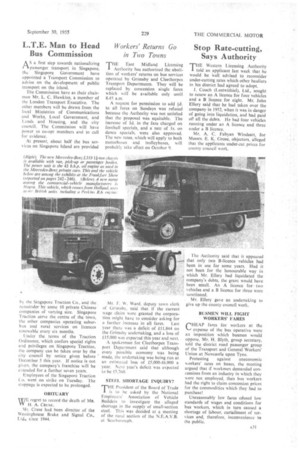Stop Rate-cutting, Says Authority
Page 33

If you've noticed an error in this article please click here to report it so we can fix it.
THE Western Licensing Authority told an applicant last week that he would be well advised to reconsider under-cutting rates which other hauliers in his district had agreed to-adopt.
J. Couch (Lostwithiel), Ltd., sought to renew an A licence for four vehicles and a B lice,nce for eight. Mr. John Ellery said that he had taken over the company in 1952, when it was in danger of going into liquidation, and had paid off all the debts. He had four vehicles running under an A licence and three under a B licence.
Mr. A. C. F'abyan Windeatt, for Messrs. E. K. Grose, objectors, alleged that the applicants under-cut prices for county council work.
The Authority said that it appeared . that only two B-licence vehicles had been in use for some years. Had it not been for the honourable way in which Mr. Ellery had liquidated the company's debts, the grant would have been small. An A licence for two vehicles and a B licence for three were sanctioned.
. Mr, Ellery gave an undertaking to give up the county council work.
BUSMEN WILL FIGHT WORKERS' FARES
cHEAP fares for workers at the
expense of the bus operative were an imposition which busmen would oppose, Mr. H. Blyth, group secretary, told the district road passenger group of the Transport and General Workers' Union at Newcastle upon Tyne.
Protesting against uneconomic workers' rates on buses, the meeting argued that if workmen demanded concessions from an industry in which they were not employed, then bus workers had the right to claimconcession prices for the commodities which they had to purchase!
Unreasonably low fares dused low standards of wages and conditions for bus workers, which in turn caused a shortage of labour, curtailment of services and, therefore, inconvenience to the public.




























































































